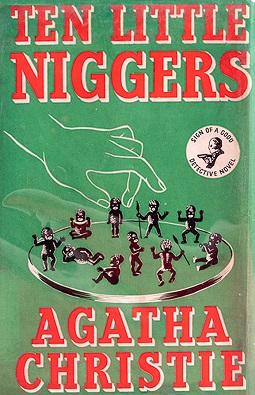Ten Little Indians (novel)

Cover of first UK 1939 edition by Stephen Bellman with original title
|
|
| Author | Agatha Christie |
|---|---|
| Original title | Ten Little Niggers |
| Country | United Kingdom |
| Language | English |
| Genre | mystery, crime, psychological thriller |
| Publisher | Collins Crime Club |
|
Publication date
|
6 November 1939 |
| Pages | 272 |
| Preceded by | Murder Is Easy |
| Followed by | Sad Cypress |
| Website | And Then There Were None |
And Then There Were None is a mystery novel by English writer Agatha Christie, widely considered her masterpiece and described by her as the most difficult of her books to write. It was first published in the United Kingdom by the Collins Crime Club on 6 November 1939, as Ten Little Niggers, after the British blackface song, which serves as a major plot point. The US edition was not released until December 1939; its American reprints and adaptations were all retitled And Then There Were None, after the last five words in the nursery rhyme "Ten Little Indians".
It is Christie's best-selling novel; with more than 100 million copies sold, it is also the world's best-selling mystery and one of the best-selling books of all time. Publications International lists the novel as the seventh best-selling title.
In the novel, a group of people are lured into coming to an island under different pretexts, e.g., offers of employment, to enjoy a late summer holiday, or to meet old friends. All have been complicit in the deaths of other human beings, but either escaped justice or committed an act that was not subject to legal sanction. The guests and two servants who are present are "charged" with their respective "crimes" by a gramophone recording after dinner the first night, and informed that they have been brought to the island to pay for their actions. They are the only people on the island, and cannot escape due to the distance from the mainland and the inclement weather, and gradually all ten are killed in turn, each in a manner that seems to parallel the deaths in the nursery rhyme. Nobody else seems to be left alive on the island by the time of the apparent last death. A confession, in the form of a postscript to the novel, unveils how the killings took place and who was responsible.
On a hot, late August day sometime in the late 1930s, eight people arrive on a small, isolated island off the Devon coast of England. Each appears to have an invitation tailored to his or her personal circumstances, such as an offer of employment or an unexpected late summer holiday. They are met by Thomas and Ethel Rogers, the butler and cook/housekeeper, who state that their hosts, Mr Ulick Norman Owen and his wife Mrs Una Nancy Owen, whom they have not yet met in person, have not arrived, but left instructions, which strikes all the guests as odd.
...
Wikipedia
